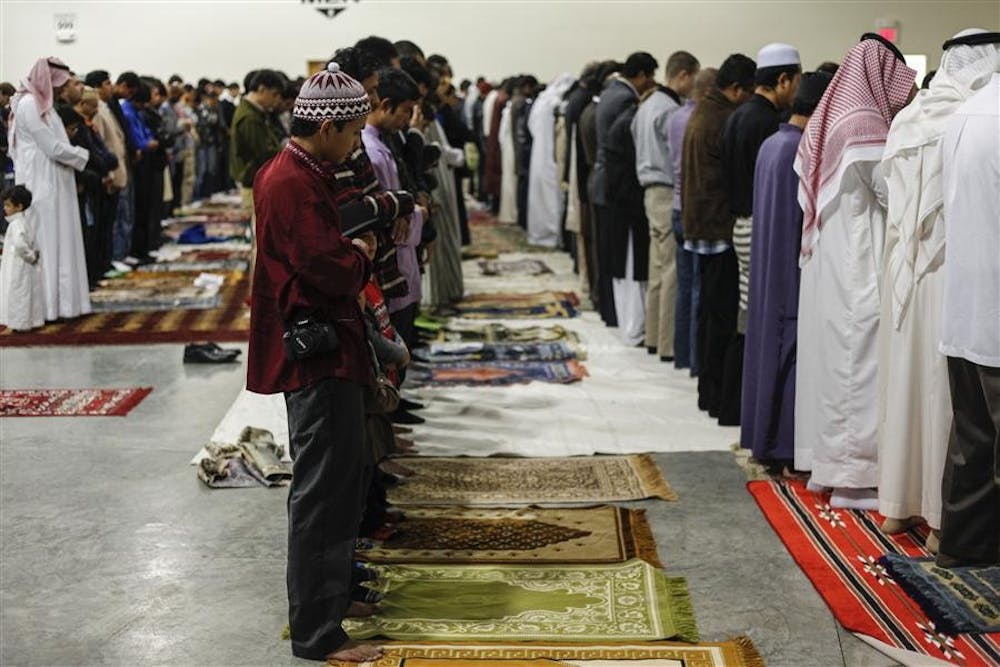About 700 people stood barefoot in the large auditorium, arms raised at eye level.
“Allahu Akbar, Allahu Akbar.”
Allah is great, Allah is great.
The Islamic congregation recited the takbir prayer three times before bowing, standing and pressing their hands and foreheads to the ground.
Performed only twice a year during the major Islamic holidays, Friday morning’s prayer marked the beginning of Eid-al-Adha, the Feast of Sacrifice.
Muslims from Bloomington and surrounding cities gathered at the Draper Earles Auditorium at the Monroe County Fairgrounds for the celebration, which began at 8:30 a.m.
The men stood with their sons on their prayer rugs on one side of the venue. The women and daughters, wearing their hijab head coverings, gathered on the other side.
The division served as a sign of respect toward the women, said Abdul Baram, president of the Islamic Center of Bloomington.
“It has nothing to do with order,” he said. “Woman is equal to man. Prayer is for woman and man.”
Baram led the crowd in the congregational prayer, which he
described as an appreciation of God, a way of asking Him for His love and mercy.
“A sense of rhythm develops,” said Bloomington resident Maha Nour. “You get a sense as though every pilgrim is saying it.”
A Feast of Sacrifice for Muslims worldwide
As the group prayed in Bloomington, a mass of about 4 million Muslims recited the same prayer in the holy city of Mecca, standing on Mount Arafat, Baram said.
The holiday marks the last day of the annual two-week pilgrimage, or hajj, that every Muslim must take at some point in their lifetime.
“We will synchronize our celebration with the people in Mecca,” Baram said. “All Muslims across the earth, wherever they are, will celebrate.”
The holiday not only marks the last day of the two-week-long hajj pilgrimage in Mecca, but also commemorates a story of obedience and sacrifice, Baram said.
Muslims believe that Ibrahim, also known as Abraham, was commanded by God in a dream to sacrifice his son, Ishmael, Baram said.
When God saw Ibrahim’s willingness to follow through with the task, he sent the Archangel Gabriel to Ibrahim with a ram, allowing the ram to be sacrificed instead.
“He wanted to test and examine the will of Ibrahim,” Baram said.
In remembrance of this sacrifice, Muslims sacrifice a lamb, camel, cow or goat, depending on the country.
It is also common for Muslims to choose to make a monetary donation as their sacrifice, providing the less fortunate with the means to sacrifice an animal, he said.
A pause for prayer in a shattered Syria
Every year, The Islamic Center of Bloomington donates to Muslims in a struggling country. This year, they chose Syria.
Baram said leading up to the Eid-Al-Adha celebration, the center had already raised enough money to send 20 sheep to Syria through the International Development Organization, a nonprofit Baram founded. The sheep will be divided among representatives in different cities across Syria.
Baram’s daughter, Mujahida Baram, is a second-generation Syrian who lives in St. Louis. She visits her family in Bloomington during the two major Muslim holidays.
Wearing a sash with the words “Free Syria” around her neck, Mujahida Baram spoke about her family in Aleppo, Syria, the country’s largest city and a key battleground for recent rebel fighting.
The Syrian Army announced Thursday it would cease military operations from Friday to Monday in observance of the holidy, according to The New York Times.
Mujahida Baram said there is still a great deal of fighting despite the ceasefire.
“Not much of a celebration is going on,” she said. “People are very scared to leave their homes.”
Mujahida Baram said some of her relatives were killed recently after a local bakery was bombarded.
“We really just keep them in our thoughts and prayers, especially during these hard times, and especially when these are supposed to be joyous occasions,” she said.
In a sermon following the prayer, Abdul Baram described the Islamic values of mutual care and support and encouraged the congregation to donate to struggling Muslims around the world.
He quoted the Prophet Muhammad, saying, “You cannot be a believer if your stomach is full and your brother is hungry.”
Following the ceremony, families embraced each other as part of the holiday tradition.
As the children went outside to enjoy an inflatable bouncer and other activities, the men and women passed Arabic coffee, dates and Turkish pastries called borek, along with several American food items and baked goods.
“It’s wonderful to see the rest of the community and celebrate together on this one day,” Mujahida Baram said. “But (we must) also remember those around the world who are less fortunate and who don’t have the capability to celebrate it.”
Eid-al-Adha celebration honors Allah

Get stories like this in your inbox
Subscribe





